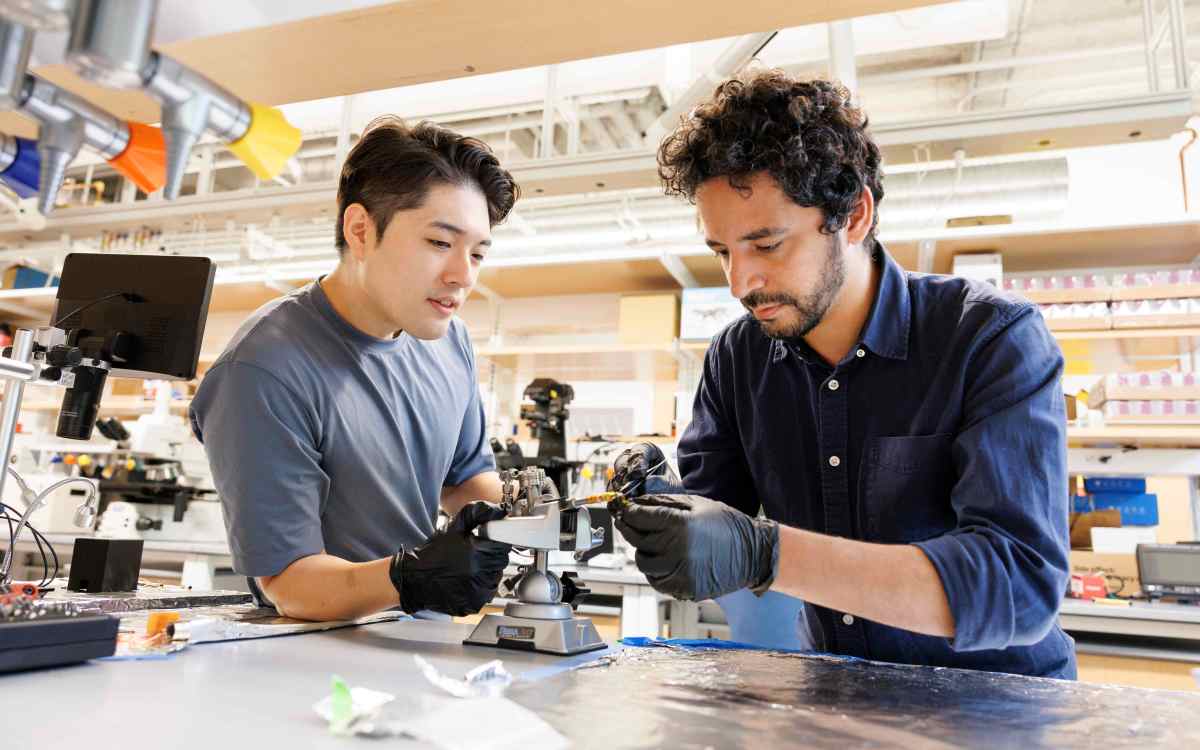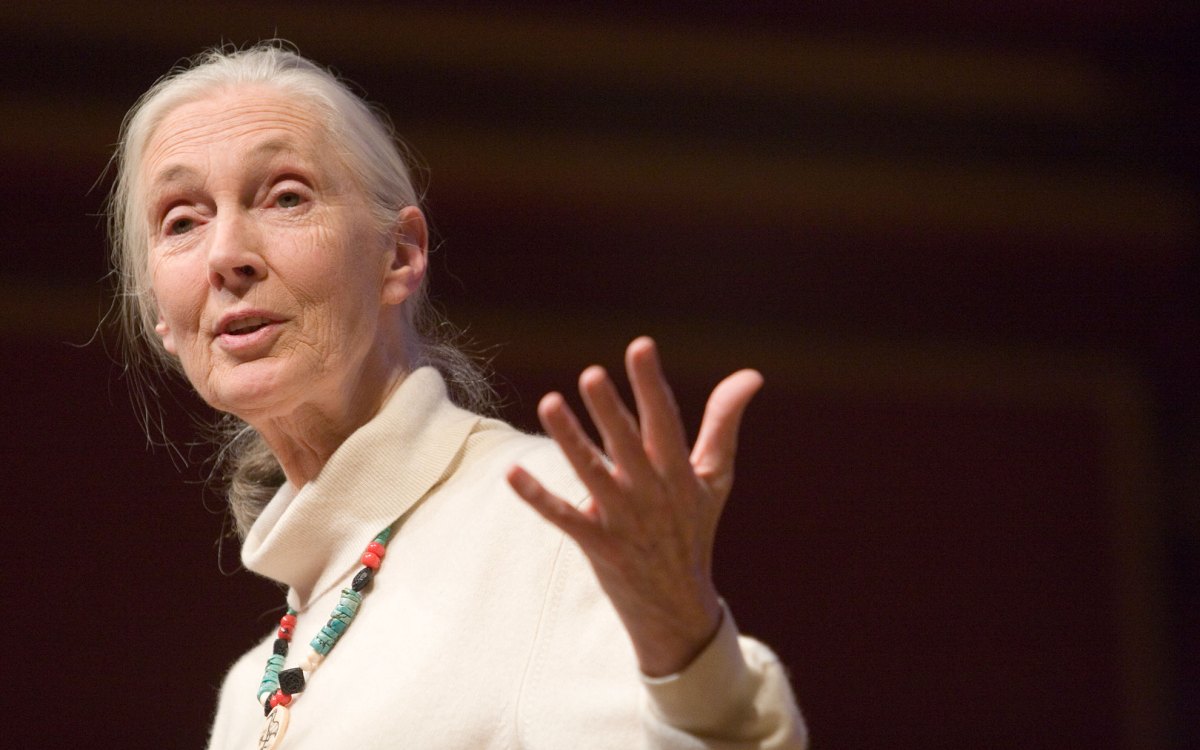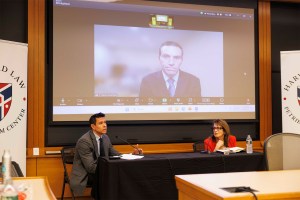Science & Tech
-

Harsh past might bare its teeth
Early adversity leads to higher aggression and fearfulness in adult canines, study says

-

What will AI mean for humanity?
Scholars from range of disciplines see red flags, possibilities ahead
-

‘Human exceptionalism is at the root of the ecological crisis’
Saving the planet requires getting over ourselves, argues author of ‘The Arrogant Ape’
-

Lauren Williams awarded MacArthur ‘genius grant’
Math professor honored for theoretical breakthroughs with sometimes surprising applications across phenomena such as tsunamis, traffic
-

-

‘She had a sense of caring for everybody that she encountered.’
Richard Wrangham remembers his teacher and colleague Jane Goodall as a force of science, empathy, and hope
-
Cherry A. Murray is named dean of SEAS
Cherry A. Murray, who has led some of the nation’s most brilliant scientists and engineers as an executive at Bell Laboratories and the Lawrence Livermore National Laboratory, has been appointed dean of Harvard University’s School of Engineering and Applied Sciences (SEAS), effective July 1, 2009. She will also become the John A. and Elizabeth S. Armstrong Professor of Engineering and Applied Sciences.
-
HMS presents award to Queen Noor, actor Edward Norton
The Center for Health and the Global Environment at Harvard Medical School (HMS) will present Queen Noor of Jordan and actor Edward Norton with the 2009 Global Environmental Citizen Award. The award, given annually, was developed to recognize those individuals who have been world leaders in protecting the global environment. The award will be presented to Noor and Norton on Sunday (March 15) in New York City.
-
New web site aids Harvard faculty seeking funding
With literally tens of billions of dollars in federal research funding suddenly available — and application deadlines for proposals extraordinarily short — Harvard’s Provost’s Office has established a new web…
-
Vivid images, stern warnings mark Ice Age ‘rock’ star’s talk
Oohs and ahhs greeted slide after slide as English author and freelance scholar Paul G. Bahn presented “The Shock of the Old: New Discoveries in Ice Age Art” at the Yenching Institute Feb 26.
-
The key to energy independence: Go fly a kite!
Earlier this year, Big Coal got its say in “The Future of Energy” lecture series sponsored by the Harvard University Center for the Environment. Now it’s time to hear from Big Wind.
-
Charbonneau gets prestigious ‘young researcher’ award
David Charbonneau, the 34-year-old Thomas D. Cabot Associate Professor of Astronomy, has been named the recipient of the National Science Foundation’s 2009 Alan T. Waterman Award, and will receive $500,000…
-
Researchers find potential cause of heart risks for shift workers
Harvard researchers at Brigham and Women’s Hospital (BWH) and colleagues have identified the potential cause of the increased risk for cardiovascular and metabolic disease in shift workers. The researchers found…
-
New committee to create University-wide conflict of interest policies and principles
A newly empaneled committee is about to begin an intensive review of University-wide conflict of interest (COI) “principles, policies and recommendations.” The committee, under the direction of David Korn, vice…
-
Science, engineering programs advancing
Harvard President Drew Faust today renewed the University’s commitment to the vision of advancing interdisciplinary, collaborative science in general, and the Department of Stem Cell and Regenerative Biology (SCRB), the…
-
The evolution of Darwin
In a fitting celebration of a man whose ideas revolutionized science, Harvard marked Charles Darwin’s 200th birthday in style.
-
Exploring hidden life’s abundance
Two miles below the surface of the Sargasso Sea lies a depression in the Earth’s crust filled with sediment and, scientists believe, teeming with life — exotic, microscopic, and very…
-
Milky Way bigger than thought
Our own Milky Way galaxy, long considered a “little sister” to the larger Andromeda Galaxy, is all grown-up, according to new research. The findings, presented at a Jan. 5 meeting of the American Astronomical Society in Long Beach, Calif., by Harvard-Smithsonian Center for Astrophysics (CfA) researchers, show that the galaxy has about 50 percent more mass — about the same as Andromeda — and is rotating about 100,000 mph faster than previously thought.
-
Harvard turns wind into power
Watch your footing on those slippery winter sidewalks in Cambridge. But if you’re at the corner of Dunster and Mt. Auburn streets, take a minute to look up.
-
Exotic force seen for first time
For the first time, researchers have measured a long-theorized force that operates at distances so tiny they’re measured in billionths of a meter, which may have important applications in nanotechnology as scientists and engineers seek new ways to create devices too small for the eye to see.
-
Mining exec: Coal vital to energy mix
The leader of one of the nation’s largest coal mining companies said Tuesday (Feb. 3) that coal is a vital part of the nation’s energy mix and that clean coal technology must be developed if the atmosphere is to stop warming.
-
The genes in your congeniality
Can’t help being the life of the party? Maybe you were just born that way. Researchers have found that our place in a social network is influenced in part by our genes.
-
Global temp analysis clarifies warming details
An analysis of global temperatures between 1850 and 2007 has illuminated some climate change details, showing that winter temperatures have risen more rapidly than summer temperatures and that the seasons are coming nearly two days earlier than they were 50 years ago.
-
Riding — and reading — the Earth tide
Once a day, Miaki Ishii rides the Earth tide, rising slowly — along with her desk, chair, and entire office — 20 to 30 centimeters before sinking back again.
-
The genes in your congeniality:
Can’t help being the life of the party? Maybe you were just born that way. Researchers at Harvard and the University of California, San Diego, have found that our place…
-
Implants mimic infection to rally immune system against tumors
Harvard bioengineers have shown that small plastic disks impregnated with tumor-specific antigens and implanted under the skin can reprogram the mammalian immune system to attack tumors. The research — which…
-
Hotter seasons coming earlier, research finds
An analysis of global temperatures between 1850 and 2007 has illuminated some climate change details, showing that winter temperatures have risen more rapidly than summer temperatures and that the seasons…
-
Transit search finds super-Neptune
Astronomers at the Harvard-Smithsonian Center for Astrophysics havediscovered a planet somewhat larger and more massive than Neptuneorbiting a star 120 light-years from Earth. While Neptune has a diameter3.8 times that…
-
Researchers find new molecule to block ‘Hedgehog’ signaling in cancer, development
Researchers have achieved a feat drug developers had thought difficult, if not impossible, discovering a compound that blocks the functioning of a key developmental protein by binding to an “undruggable”…
-
Inmates suffer from chronic illness, poor access to health care
The nation’s prison and jail inmate population struggles with high rates of serious illness and poor access to care, according to the first nationwide study of inmate health and health…
-
“My genome, my self”
One of the perks of being a psychologist is access to tools that allow you to carry out the injunction to know thyself. I have been tested for vocational interest…
-
Researchers control the assembly of nanobristles into helical clusters
From the structure of DNA to nautical rope to distant spiral galaxies, helical forms are as useful as they are abundant in nature and manufacturing alike. Researchers at Harvard’s School…
-
Researchers see exotic force for first time
For the first time, researchers have measured a long-theorized force that operates at distances so tiny they’re measured in billionths of a meter, which may have important applications in nanotechnology…
-
Milky Way bigger, faster than previously thought
Our own Milky Way galaxy, long considered a “little sister” to the larger Andromeda Galaxy, is all grown-up, according to new research presented today that shows the Milky Way to be bigger and faster than previously thought.
-
New visualization techniques yield star formation insights
New computer visualization technology developed by the Harvard Initiative in Innovative Computing has helped astrophysicists understand that gravity plays a larger role than previously thought in deep space’s vast, star-forming…
-
John P. Holdren named President-elect Obama’s Science Advisor
President-elect Barack Obama today announced that he has selected Harvard’s John P. Holdren to serve as Assistant to the President for Science and Technology in the new administration. The post,…


